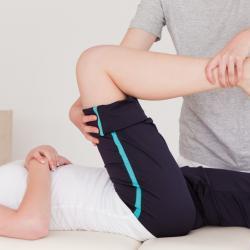Main Menu
Latest Blog Entry
User login
What is causing pain at the front of my knee?
Many athletes and recreational sports people suffer from on-going knee pain and soreness. Today Physiotherapist Sarah Marshall looks in more detail at one aspect.
One of the most common types is Anterior Knee Pain (AKP). It describes pain at the front of the knee and can affect up to 40% of the population. It is especially common amongst athletes, yet not disrupt their sporting function or ability.
What are the causes of AKP?
There are many causes of AKP and I have listed the most common below. Symptoms will often present without specific injury. Any persistent pain must be assessed by an appropriate medical professional in order to make an accurate diagnosis who will then advise on the correct treatment plan.
Patello-Femoral Joint Pain (PFJP) is by far the most common cause of AKP. Athletes will describe pain in and around the patella. I would not expect to see any significant swelling around the knee joint.
Symptoms are usually aggravated by stairs, kneeling, squatting, lunging and running. PFJP can also cause pain at rest, especially when sitting for long periods (movie goer’s knee).
A Patella Tendonopathy, Fat Pad Irritation / Impingement, Bursitis and Patella Instability with also produce AKP.
What causes PFJP
There are many contributing factors to the development of PFJP
- Local muscle weakness (especially quadriceps)
- Poor neuromuscular control
- Muscle tightness (especially quadriceps and hamstrings)
- Poor hip / pelvic control / stability
- Poor foot posture / mechanics
All of the above will increase the functional loading of the Patello-Femoral Joint which is likely to cause inflammation and pain with repeated use. PFJP is also a very common complaint following any knee joint surgery and must not be missed as referred pain from an old Posterior Cruciate Ligament injury.
Management of PFJP

Get your knee assessed by a Chartered Physiotherapist
Always seek professional advice if you can before embarking on a rehabilitation programme. Initially, pain levels need to be managed and controlled before early rehabilitation can be progressed.
Pain Management
- Activity modification i.e. avoid aggravating factors
- Taping techniques
- Acupuncture
- Soft tissue massage
Rehabilitation
- Stretching programme (hamstrings, quadriceps, gastrocnemius, anterior hip structures)
- A graded strengthening programme with initial emphasis on quadriceps
- Hip and pelvis stability exercises ( transversus abdominus, gluteus medius)
(Post rehab, there are 3 keys to maintaining Knee Health)
There are limited surgical options for this problem with relatively poor outcomes.
A biomechanical assessment of the foot can help determine whether shoes orthotics are indicated. Commitment to rehabilitation must be adhered to for many months in order to achieve individual goals.
Unfortunately, without the appropriate management, PFJP often develops into a chronic problem.
If you want an individual assessment on your knee pain, then please book in to see me.
Sarah Marshall
Client Testimonials
 Blundells School
Blundells School
James has a huge breath and depth of knowledge on fitness issues. He is able to implement this knowledge into a practical course both making the task of fitness and conditioning both different and interesting from other fitness training that most are familiar with. He understands the safety issues when dealing with young adults strength and conditioning programmes. Programmes he sets are tailored to the individual needs of the group. There was a huge amount of progress made with some of these individuals in terms of their understanding of fitness and their own fitness levels.
More


Comments
[…] What is causing pain at the front of my knee? […]
[…] More acute injuries to the meniscus and ligaments are also prevalent in tennis. Risk can be reduced with ongoing work on strength, flexibility and agility.(More details on Knee injury management here) […]